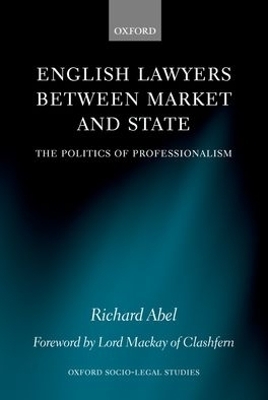
English Lawyers between Market and State
The Politics of Professionalism
Seiten
2004
Oxford University Press (Verlag)
978-0-19-826034-9 (ISBN)
Oxford University Press (Verlag)
978-0-19-826034-9 (ISBN)
Reform of the English legal profession, initiated by a Conservative Lord Chancellor during the 1990s and extended by his Labour successor, transformed traditions, over the vigorous objections of the judiciary, Bar, and Law Society. This title mines that tumultuous period for insights into the prospects of professionalism in the 21st century.
Toward the end of the twentieth century, English lawyers enjoyed widespread respect and prosperity. They had survived criticism by practitioners and academics and a Royal Commission enquiry, but the final decade witnessed profound changes. First the Conservatives sought to apply laissez-faire principles to the profession. Then Labour transformed the legal aid scheme it had created half a century earlier. At the same time, the profession confronted cumulative changes in higher education and women's aspirations, internal and external competition, and dramatic fluctuations in demand. This book analyses the politics of professionalism during that tumultuous decade, the struggles among individual producers (barristers, solicitors, foreign lawyers, accountants) their associations, consumers (individual and corporate, public and private) and the state to shape the market for legal services by deploying economic, political and rhetorical resources (including changing conceptions of professionalism).
The profession had to respond to a greatly increased production of law graduates and the desire of lawyer mothers (and also fathers) to raise their families. It had to replace exclusivity with efforts to reflect the larger society (class, race, gender). The Bar needed to address challenges to its exclusive rights of audience from both solicitors and employed barristers and decide whether to retaliate by permitting direct access, thereby compromising its claim to be a consulting profession. Solicitors had to reconcile their invocation of market principles against the Bar with their resistance to corporate conveyancing and multidisciplinary practices. Government had to restrain a demand-led legal aid scheme; practitioners and their associations sought to pressure the government to expand eligibility and raise remuneration rates.
Divisions within both branches so compromised self-regulation and governance that the government even threatened to deprive lawyers of those essential elements of professionalism.
These challenges have begun a transformation of the legal profession that will shape its evolution throughout the twenty-first century.
Toward the end of the twentieth century, English lawyers enjoyed widespread respect and prosperity. They had survived criticism by practitioners and academics and a Royal Commission enquiry, but the final decade witnessed profound changes. First the Conservatives sought to apply laissez-faire principles to the profession. Then Labour transformed the legal aid scheme it had created half a century earlier. At the same time, the profession confronted cumulative changes in higher education and women's aspirations, internal and external competition, and dramatic fluctuations in demand. This book analyses the politics of professionalism during that tumultuous decade, the struggles among individual producers (barristers, solicitors, foreign lawyers, accountants) their associations, consumers (individual and corporate, public and private) and the state to shape the market for legal services by deploying economic, political and rhetorical resources (including changing conceptions of professionalism).
The profession had to respond to a greatly increased production of law graduates and the desire of lawyer mothers (and also fathers) to raise their families. It had to replace exclusivity with efforts to reflect the larger society (class, race, gender). The Bar needed to address challenges to its exclusive rights of audience from both solicitors and employed barristers and decide whether to retaliate by permitting direct access, thereby compromising its claim to be a consulting profession. Solicitors had to reconcile their invocation of market principles against the Bar with their resistance to corporate conveyancing and multidisciplinary practices. Government had to restrain a demand-led legal aid scheme; practitioners and their associations sought to pressure the government to expand eligibility and raise remuneration rates.
Divisions within both branches so compromised self-regulation and governance that the government even threatened to deprive lawyers of those essential elements of professionalism.
These challenges have begun a transformation of the legal profession that will shape its evolution throughout the twenty-first century.
Richard Abel is Connell Professor of Law, UCLA. He is a member of the Bars of New York and Connecticut.
1. The Legal Profession in English Politics ; 2. An Unlikely Revolutionary ; 3. Halting the Tide ; 4. Reflecting Society? ; 5. Defending the Temple ; 6. Controlling Competition ; 7. Conservatives Cut Legal Aid Costs ; 8. Labour Ends Legal Aid As We Know It ; 9. Serving Two Masters: The Dilemma of Self-Regulation ; 10. Governing a Fractious Profession ; 11. The Future of Legal Professionalism
| Erscheint lt. Verlag | 1.6.2004 |
|---|---|
| Reihe/Serie | Oxford Socio-Legal Studies |
| Verlagsort | Oxford |
| Sprache | englisch |
| Maße | 156 x 234 mm |
| Gewicht | 1141 g |
| Themenwelt | Recht / Steuern ► Allgemeines / Lexika |
| Recht / Steuern ► EU / Internationales Recht | |
| Recht / Steuern ► Privatrecht / Bürgerliches Recht ► Berufs-/Gebührenrecht | |
| Sozialwissenschaften ► Soziologie | |
| ISBN-10 | 0-19-826034-2 / 0198260342 |
| ISBN-13 | 978-0-19-826034-9 / 9780198260349 |
| Zustand | Neuware |
| Haben Sie eine Frage zum Produkt? |
Mehr entdecken
aus dem Bereich
aus dem Bereich
Muster und Erläuterungen zum Gerichts- und Notarkostengesetz (GNotKG)
Buch | Softcover (2024)
C.H.Beck (Verlag)
45,00 €
mit Gerichtskostengesetz, Gesetz über Gerichtskosten in …
Buch | Softcover (2024)
dtv Verlagsgesellschaft
15,90 €


